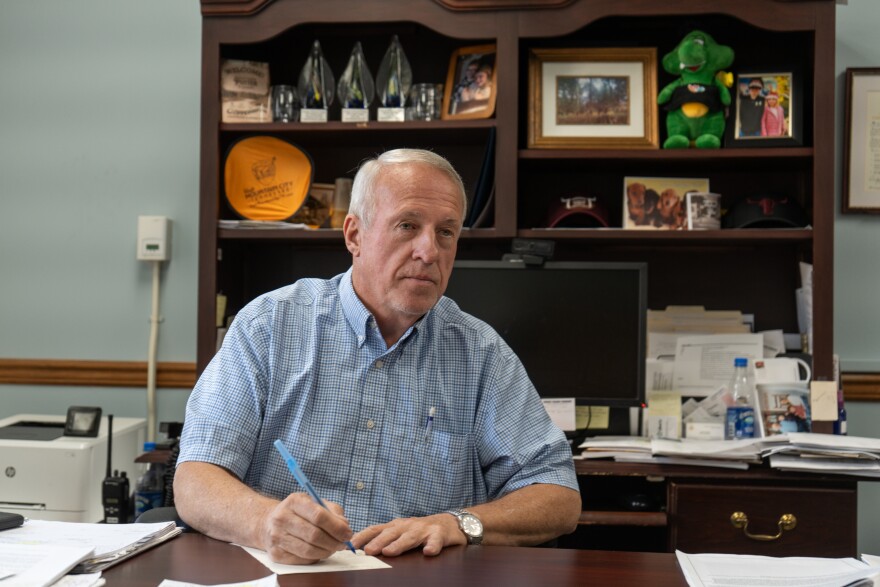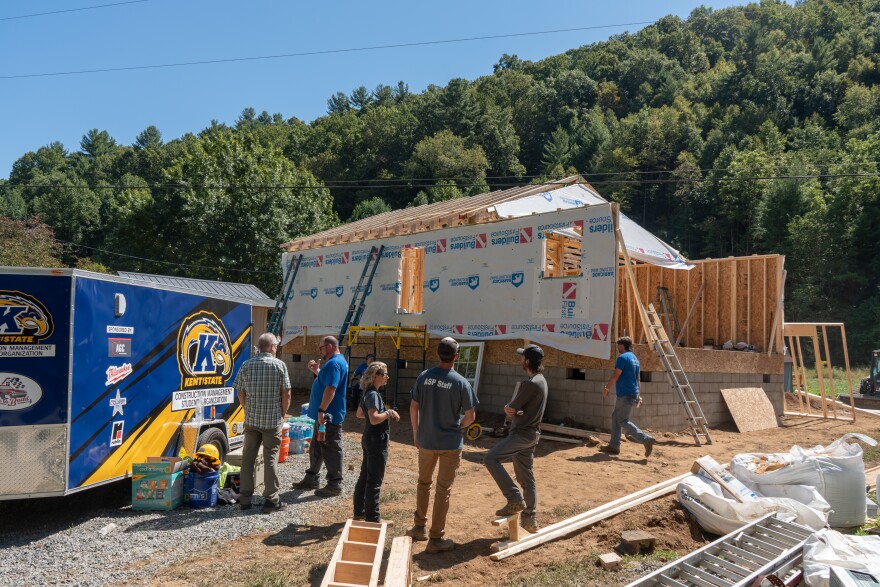When Hurricane Helene struck rural Johnson County last September, it brought flooding the likes of which Mayor Larry Potter says he’s never seen.
“The little ditches and the roads became creeks,” Potter said. “And the creeks became raging rivers.”
Hundreds of homes were destroyed, and even more were left with ruinous damage. Roads, bridges, and other public utilities were out in many places.
Potter says he felt helpless.
“You see it on TV, but when you stand there, you feel pretty useless and helpless,” Potter said. “The people you're trying to help are just picking up one piece at a time.”
One year later, local governments across rural East Tennessee are still working to restore roadways, bridges, and other public utilities. But many are struggling to come up with the funds to do the work that needs to be done, as they continue to face hurdles in getting reimbursement from the Federal Emergency Management Agency.
Some have had to delay significant projects, like jails or water utilities. Others have had to take out government loans so major bridges and roadways can be repaired.
‘We just don’t have no money’
Last winter was one of the worst that Johnson County had ever seen. In some places, locals say temperatures dipped below zero. But the local governments weren’t in much of a position to help. Mayor Potter says the county has been strapped for cash.
“We just don't have no money,” he said. “I went to Nashville two Mondays back to back literally begging for money.”
Potter said it’s extremely difficult for his small county to communicate with Nashville. When he applies for state grants, they often get generic rejection letters asking them to call a phone number.
“You call the number, the number’s not even in service,” Potter said. “That’s pretty bad from state government.”
His in-person visits to the state Capitol did turn up some funds for recovery. The county was allocated $434,246 from the Governor’s Response and Recovery Fund. While he’s grateful for the help he’s received, he says it’s a drop in the bucket. To even begin to replace roads and infrastructure, the county has had to borrow $10 million.
“In 2028, I think it is, our county would have been out of debt,” Potter said. “But now with this hurricane, we just went backwards.”

Potter says his county is also facing roadblocks set by FEMA. Despite reports from the county’s highway department detailing the damage done to roads and bridges, the agency has repeatedly sent its own people out to assess their condition. It takes time, and delays the reimbursement process.
“FEMA has rode some of these roads so many times,” Potter said. “They've been measured. They've rode them again.”
The county has so far received a roughly $1 million commitment from FEMA for road and bridge repair, but Potter says the more time passes, the more urgent the need becomes.
“I need my money back ASAP,” he said.
Local projects languish under FEMA oversight
One-Hundred miles to the southeast, Cocke County is facing similar challenges. Mayor Rob Mathis says his county can’t front much of the money required for repairs.
“This is a chronically distressed county,” Mathis said. “Our goal is to come off that list.”
While the county has made progress towards that goal – Mathis says they’ve added over 1,000 jobs since he took office – they’re still a long way from self-sufficiency. After Helene, they’re almost entirely beholden to the state and FEMA for help with rebuilding.
But Mathis says FEMA has been difficult, and at times downright combative. They’ve been struggling to come to an agreement on a replacement county jail after Helene destroyed the old one, which had stood for nearly 80 years.

“They told us, ‘you know what, we're not even going to rebuild anything,’” Mathis said. “‘Eighty-eight beds are off the table now too. We're not rebuilding anything. We're just probably going to cut you a check for a few hundred thousand and see ya.’”
When the old Cocke County jail was built in the 1940s, it had capacity for 88 beds. But modern state standards require county jails to have at least 216 beds, which would require a larger and more expensive facility than the one that was destroyed.
Mathis says FEMA doesn’t want to pay for that extra expense, and has placed several roadblocks that if left unresolved will saddle the county with $80 million in debt for a new jail.
“We don't have $80 million,” Mathis said. “Our entire operating budget for last year – taking out the school system – just to run the county was $35 million.”
WUOT News reached out to FEMA for comment on this story but received no response during an ongoing federal government shutdown.
Volunteer groups step up
Without government support, most families are relying on the generosity of nonprofits and churches in their community. In Johnson and Cocke counties, long-term recovery coalitions are funneling funds to families who have lost their homes and jobs.
Neela Pleasant is the treasurer for the Johnson County Long-Term Recovery Group. She says she’s working to get state support for their projects, which include rebuilding and refurnishing destroyed homes, providing food and water, and helping people find jobs.
“We are trying to be very careful in how that money is spent,” she said.
That’s because the more time passes since Helene struck, the fewer financial donations communities receive. Right now, Johnson County’s long term recovery group is operating thanks to a $1 million gift from a private donor. They’re hopeful others will step up before that money runs out.

It’s unclear when the state will disburse additional funds to aid in the recovery process. At a press conference in Knoxville, Tennessee Governor Bill Lee acknowledged the long road to recovery that lies ahead, and said his government was working to get additional aid to farm communities.
“There will be an ongoing effort over the years, as we rebuild in these communities, to find ways that can provide relief and continue to support those upper east communities,” Lee said.
In the meantime, most communities throughout East Tennessee are relying on the generosity of private donors to get by.







